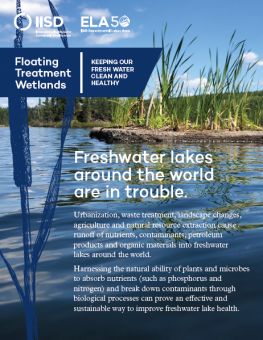
Floating Treatment Wetlands: Keeping our fresh water clean and healthy
We explain how, where and why floating treatment wetlands can be used to keep freshwater bodies clean around the world.
Freshwater lakes around the world are in trouble.
Urbanization, waste treatment, landscape changes, agriculture and natural resource extraction cause runoff of nutrients, contaminants, petroleum products and organic materials into freshwater lakes around the world.
Floating treatment wetlands (FTWs) or islands are small artificial platforms that allow aquatic plants to grow in water that is typically too deep for them. The unique ecosystem that develops creates the potential to capture nutrients and transform common pollutants that would otherwise plague and harm our lakes into harmless by-products.
This brochure explains how, where and why FTWs can be used to keep freshwater bodies clean.
Participating experts
You might also be interested in
Northwest Ontario Side Story: IISD Experimental Lakes Area Annual Report 2022-2023
This year's annual report is a celebration of all things creative at the world's freshwater laboratory, from the science to music, photography and theatre.
Freshwater connectivity can transport environmental DNA through the landscape
A new study conducted at IISD-ELA found that the movement of water between freshwater bodies can transport eDNA which complicates the question of how accurately it can be used to monitor species.
Microplastics now pervasive in Great Lakes, with 90% of water samples surpassing safe levels for aquatic wildlife: new studies
Data spanning the last ten years reveal that the Great Lakes basin is widely contaminated with microplastics, with potentially dangerous consequences for the wildlife that live within.
These nearly invisible organisms help clean Lake Tahoe's water. Here's how they do it
Plankton are not just a diabolical mastermind on a Nickelodeon show about a sponge who lives under the sea. Lake Tahoe is filled with them—the good kind. Tahoe native zooplankton are making a comeback in the more than 21-mile long lake, helping it look the clearest it has in 40 years. A comeback because until now, the microorganism's population significantly decreased after it's primary predator, the Mysis shrimp, was on the rise, according to previous Sacramento Bee reporting.